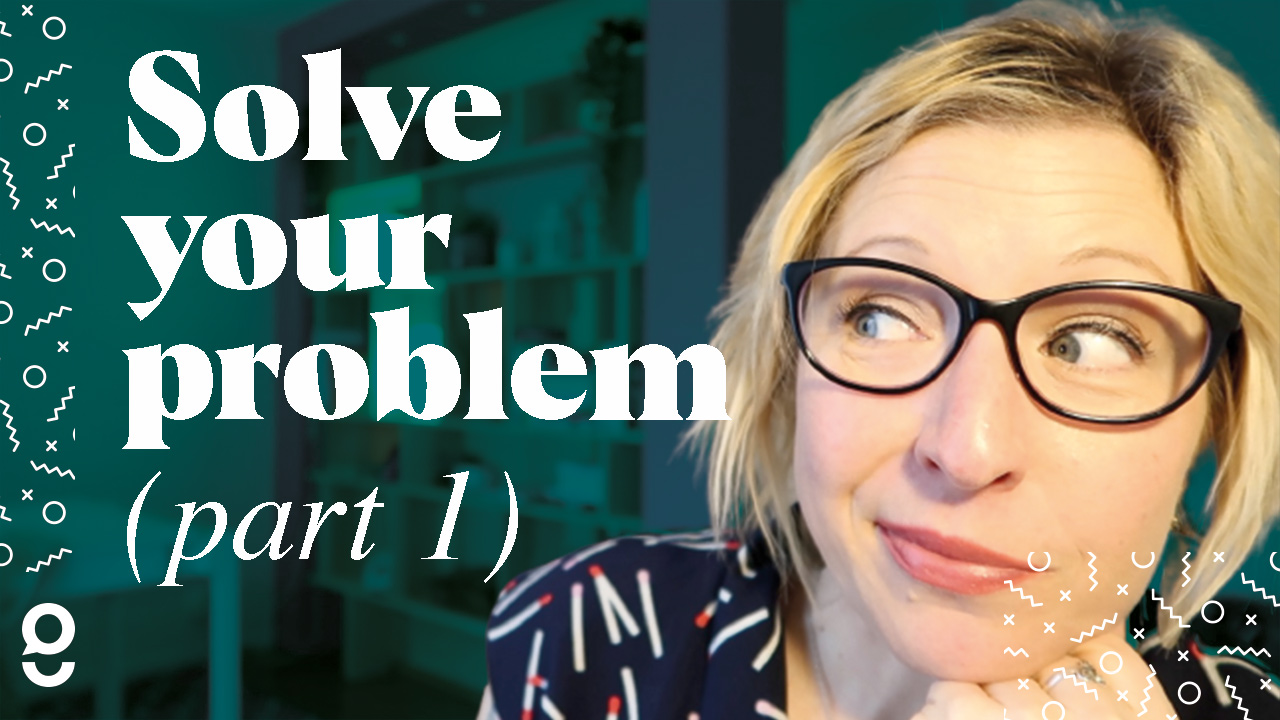
Don’t you just love problems?
In business, and in life, solving complex problems is kind of…what we do.
The world is absolutely full of interesting problems. You’re probably solving some of them already!
I know this because I work with so many incredible clients.
They’re finding new ways to heal people who are sick. Or they’re finding ways to keep making and supplying cars…or electronic equipment–even when it’s hard to find the supplies to do this. They’re solving social problems or interesting business problems.
As a language coach, I get to hear the most inspiring stories!
Today’s blog post–and video is part 1 of a two-part series on solving problems–in English.
We’ll tackle (or solve) a problem together and you’ll learn plenty of great expressions doing it. Today, we’ll focus on understanding our problem better.
Next week, in Part 2, we can talk about smart ways to solve the problem.
So what’s a common problem for you–and a lot of other smart, busy people listening to this video?
Improving your English!
It’s the same problem all the amazing people who are watching this with you and learning alongside you are tackling too.
We’ll use problem-solving strategies that would also work for keeping your business competitive in a changing market…or for dealing with other complex problems–like climate change!
Ready to solve an interesting problem together?
Get the worksheet to test what you learn in this lesson!
Did you know that I’ve made a worksheet to go with this lesson so that you can practice everything you see here today? I want you to make this part of the English you actually use in real life!
GET THE WORKSHEET: Make sure you practice these expressions so you can use them in real life with this worksheet made for you by a Neurolanguage coach.
Index:
1. Solving interesting problems: #1 Understand the problem.
2. Solving interesting problems: #2 Great questions to help you define your problem–in English.
3. Solving interesting problems: #3 See that you CAN solve the problem!
1. Solving interesting problems: #1 Understand the problem.
Are you excited about ‘getting stuff done?’ That’s an expression we use a lot with my team of expert teachers…we like accomplishing our goals!!
But if you want to be able to ‘get stuff done,’ you need to be willing to really understand any problems or challenges you have.
You need to get a good look at your problem. It’s important to have a good understanding of your problem if you’re going to solve it.
Did you know that in English we even talk about getting perspective on your problem? Seeing it from another angle? We sometimes say you need to step back and think it through.
To help you really understand your problem, you might ask yourself some specific questions about it. Let’s put that into action with our problem of improving your English… Ready?
Also check out my lesson: Understand a Real-Life Video in English & Learn about Habits and Motivation [+Worksheet]
2. Solving interesting problems: #2 Great questions to help you define your problem–in English.
Here are some questions to help you define your problem–or understand exactly why it’s a problem and exactly what you should try to fix first. By the way, many of these questions are inspired by a great article in Indeed.com, a career magazine in English–yes, this is exactly how we talk about solving problems in English.
Question #1: Does your problem hurt your well-being or the well-being of others?
Ok, fixing your English problem isn’t the same as curing a rare disease, but a lot of my clients say that their English hurts them.
Let’s take our example of pushing your English beyond intermediate.
When I first meet with new, I ask them what is really bothering them in their English.
They might tell me that their English stops them from even searching for new clients. Or that it stops them from answering the phone…or that it is causing them to lose work or miss promotions.
Knowing how a problem affects your daily life lets you fix the problem.
For example, let’s say you realize that their English is stopping you from even contacting new clients. You could start working right away on the kinds of conversations you are likely to have with those new clients. And if you’re feeling that confidence and spontaneity is something that’s missing from your English, you could sign up for a conversation club for extra practice–like my Faster Fluency Conversation Club.
Question #2: Does your problem hurt your productivity?
In other words, does your problem make it harder for you to do your work?
So taking the example of your English (or your team’s English), ask yourself if this problem is stopping you from getting your work done. Or from earning more money. Or if it’s stopping you from trying to take on new projects in the first place.
I’ve had people who struggled with things in English like being firm but diplomatic with a difficult employee, for example. Or with leading meetings in English.
Working on your English for those specific situations can help you increase your productivity much more quickly than if you focus on something general–like ‘improving’ your English.
Question #3: Does your problem hinder your communication?
Obviously, it’s harder to solve any problem when the problem stops you from communicating. You can’t ask for help, or reach out to others, collaborate…
I know exactly what it’s like to be in this situation. I’ve shared before about what it was like when I used to have to ask my husband for help calling business clients in French!
And if your English is one of your problems…chances are, it’s hurting your communication!
Question #4: Does your problem decrease efficiency?
Think of that email you spend 2 hours writing when it takes you 15 minutes in your native language. Think of all the times you let the phone go to voicemail instead of answering and quickly solving a problem.
The more time you lose to a problem, the more urgent it probably is to solve it.
How much time are you losing to your English?
GET THE WORKSHEET: Make sure you practice these expressions so you can use them in real life with this worksheet made for you by a Neurolanguage coach.
3. Solving interesting problems: #3 See that you CAN solve the problem!
Ok, so you might be starting to get a little uncomfortable looking at this problem so closely!
But it’s important to remind yourself that it’s OK.
Clearly understanding your problem–and how it affects your daily life–is actually one of the most effective steps you can take towards fixing your problem!
There is something else you have to really understand about your problem if you want to find solutions and get things done!
You need to understand that you can fix it.
I’m going to share some advice (and great business English expressions) from Gemma Leigh Roberts, an organizational psychologist.
Roberts writes about resiliency and something called mental agility…that is, the ability to respond in new ways to changing problems.
Here’s a quote by Roberts I find so inspiring:
“It’s not about having all the answers – but about being confident that you can figure out a new way of doing things to get where you want to go.”
In other words: it’s ok to have complex problems. You just need to believe that you can find new ways to solve them.
Are you a problem solver?
Then you’re like a lot of people who watch my videos, or who come to Faster Fluency Conversation Club.
Maybe you’re working on more than one problem at once these days. A lot of inspiring people I know today are.
Next week, I’m really excited to continue this two-part series with you and talk about the next steps in our work together on ‘getting stuff done!’ Ready to solve this interesting problem with me?
Also check out my lesson: Master these 4 essential business situations and feel confident working in English.
Take the next step: Improve your English in the comments
The best way to become more confident using Business English is to practice!
Here’s your Confidence Challenge for this week:
- Start by knowing your problem: what is one way that your English affects your daily life?
- Believe you can find new solutions: what is one new solution you found to a problem you faced?–any problem.
If you learned something from this lesson, please share it with your coworkers & friends. You can send your message to them in English for more practice!
Click here to share this article on LinkedIn
Click here to share this article on Facebook
Become absolutely more confident in English, with less effort
If you would like to take the next step with me, discover my Faster Fluency Conversation Club Membership Program!
It helps you become more confident speaking in conversations, and get a lot more vocabulary on many different topics! And it’s a fabulous community of “English buddies” from around the world!
TIP: Use the code FFCC40 to save -40% off your 1st month of membership!
More details at
https://mybusinessenglishcourses.com/faster-fluency-conversation-club/join-now
Can’t wait to see you in the Club,
Christina
More good stuff…
Click the image to learn more







